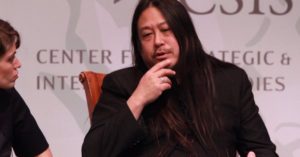 |
| Kaiser Kuo during the interview |
The U.S. China Perception Monitor:
My primary interest has always been in addressing the perception gaps that Americans or other English-speaking people have toward China, and right now I’ll only speak about those, though I think it’s important that perception gaps going the other way also be addressed.
Part of the U.S. perception gap has to do with media coverage of China. Most Americans know what they think they know about contemporary China through watching, reading, and listening to news reports. And while I happen to think that, especially given the conditions for reporting in China, our media on balance does an excellent job of reporting, there are nonetheless structural realities about the way that news is created and consumed that end up contributing to misperceptions.
When I read the New York Times or watch an hour of network or cable news, even though there are many, many stories on any given day that might make me think the country is going down in flames – more chaos in the White House, the president’s latest inchoate Twitter rantings, another unarmed black man gunned down by police, another prominent man exposed for sexual misconduct – there are also the rest of the stories in the paper about really banal and quotidian things, as well as plenty of feel-good news: trend stories, food stories, scientific breakthroughs, your basic human interest fare. And more importantly, I also have the lived experience of the U.S., and I know that despite all the negative pieces I’ve just read in the paper, I don’t expect that when I open my window I’ll hear the din of street battles and smell burning tires.
Unfortunately, when I read that same newspaper or take in that newscast, the few stories I’m likely to encounter about China will focus on the unusual – and often, that means they’ll focus on the negative. This isn’t because there’s some plot among media elites to make China look bad. It’s fundamentally structural to the news business. Reporters write about the planes that crash, not the ones that land safely. They write about the bridges that collapse, and not about the ones that don’t. And so it’s only natural that they’d write about the repression of ethnic minorities, or elite conflict, or official malfeasance, or environmental catastrophe, or mass protest. The problem is that for an American reading these, without those other banal or even pleasant stories to offer a fuller picture, and without that lived experience of China, many readers – I daresay most – will come away with a picture of China that is disproportionately negative.
Reporting by American media outlets is, to the very best of my knowledge, quite accurate. There really is an atrocity underway in Xinjiang, where efforts to assimilate Uyghurs include extralegal detentions with no due process, where fundamental features of the Uyghur culture itself are under assault, and where sophisticated technologies are being used to monitor and track people in ways that clearly violate any reasonable norms of privacy. There really is horrific environmental degradation in many parts of China. There really is extensive censorship of all media, including the internet. The reporting on all of this – and much more – has been accurate. But accurate isn’t the same thing as realistic. It’s not, one might argue, the media’s responsibility to paint this more complete realistic picture. So I’m afraid this just isn’t something that can easily be fixed. All any of us can hope to do is to try and present more of the complete picture.
There’s another set of issues that contribute significantly to gaps in perceptions of China when viewed from the U.S., and these have mostly to do with the relationship Americans today have with history. We tend to see history as basically teleological – that it has a goal or an endpoint, that it moves in a particular direction. It’s really baked into our language, and it’s hard to transcend. We don’t recognize how contingent history actually is. This has been especially pronounced, I think, since the end of the Cold War and the collapse of Soviet Communism. Having seen off two great ideological enemies, fascism and communism, we were more convinced than ever of being on the right side of history – and less apt to interrogate the assumptions undergirding our teleological view of history, less apt to recognize the contingency of it all. So we now stand on one side of what is a fundamentally historical chasm, looking across at China, and wondering why it can’t just cross over to where we are. We don’t bother to look down into that chasm and reflect on the tortuous path that got us to this side: all the narrow escapes, lucky throws of the dice, and all the blood and bodies along that path.
More at the U.S. China Perception Monitor.Our lack of historical perspective also tends to make us impatient. It’s easy to see how someone without a knowledge of history can look at China and see a very modern and developed state. Superficially, it could look that way. But lacking an appreciation for history, we don’t recognize how the impressive advances in China’s hardware – the gleaming infrastructure, the megacities, the high technology, all built in the span of this one generation – isn’t yet matched by the software. Those changes take time. In that regard, I think in all fairness China has already come a long way, but it’s the disconnect between the very modern facade and an interior political culture that, at least by our standards, isn’t commensurately modern that throws people.
Kaiser Kuo is a speaker at the China Speakers Bureau. Do you need him at your meeting or conference? Do get in touch or fill in our speakers' request form.
Are you looking for more media experts at the China Speakers Bureau? Do check out this list.
No comments:
Post a Comment